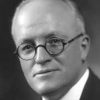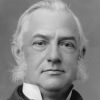Thou knowest that since the invention of gun-powder, there is no place impregnable: that is to say, Usbek, there is no longer any asylum upon earth against injustice and violence. I always tremble for fear at last some invention will be found out of a shorter way to destroy mankind, and to depopulate whole nations and whole kingdoms.
[Tu sais que, depuis l’invention de la poudre, il n’y a plus de places imprenables ; c’est-à-dire, Usbek, qu’il n’y a plus d’asile sur la terre contre l’injustice et la violence. Je tremble toujours qu’on ne parvienne à la fin à découvrir quelque secret qui fournisse une voie plus abrégée pour faire périr les hommes, détruire les peuples et les nations entières.]
Charles-Lewis de Secondat, Baron de Montesquieu (1689-1755) French political philosopher
Persian Letters [Lettres Persanes], Letter 106, Rhedi to Usbek (1721) [tr. Ozell (1760 ed.), # 105]
(Source)
(Source (French)). Alternate translations:
Thou knowest, that since the Invention of gun-powder, there is no place impregnable; that is to say, Ushek, that there is not any longer an asylum upon earth against injustice and violence. I always tremble, left they should at arrive at last, at the discovery of some secret, which may furnish them with a shorter way to destroy mankind, and to depopulate whole nations and whole kingdoms.
[tr. Floyd (1762), # 105]
You know that since the invention of gunpowder no place is impregnable; that is to say, Usbek, that there is no longer upon the earth a refuge from injustice and violence. I dread always lest they should at last discover some secret which will furnish them with a briefer method of destroying men, by killing them off wholesale in tribes and nations.
[tr. Davidson (1891)]
You know that, since the invention of gunpowder, no fortress is impregnable; that is to say, Usbek, that there is no longer upon earth an asylum against injustice and violence. I am always in terror lest some secret or other should be at length discovered that will not only kill men, but destroy entire tribes and nations.
[tr. Betts (1897)]
You know that since the invention of gunpowder there have been no impregnable places; and this is to say, Usbek, that there is no longer an asylum from injustice and violence any¬ where on the earth. I am in constant terror that ultimately someone will succeed in discovering some secret which will furnish an even more efficient way to kill men, by destroying whole peoples and entire nations.
[tr. Healy (1964)]
You know, since the invention of gunpowder, no fortification is impregnable; in other words, Usbek, there no longer exists, anywhere on earth, any asylum from injustice and violence. I live in fear that men of science will eventually discover some secret which would offer a faster day to kill people, destroy races, and wipe out entire nations.
[tr. Mauldon (2008)]
You know that since the invention of gunpowder, no place is impregnable -- and that is to say, Usbek, that there is no place on earth where we are safe from injustice and violence. I tremble at the thought that eventually someone will discover some new secret that will lead to an even more efficient way to kill even more people, perhaps to destroy entire populations and nations.
[tr. MacKenzie (2014), # 105]
Quotations about:
safety
Note not all quotations have been tagged, so Search may find additional quotes on this topic.
Everyone has a confused notion of good,
On which he sets his mind, and which he desires;
And therefore everyone tries to attain it.[Ciascun confusamente un bene apprende
nel qual si queti l’animo, e disira;
per che di giugner lui ciascun contende.]Dante Alighieri (1265-1321) Italian poet
The Divine Comedy [Divina Commedia], Book 2 “Purgatorio,” Canto 17, l. 127ff (17.127-129) [Virgil] (1314) [tr. Sisson (1981)]
(Source)
(Source (Italian)). Alternate translations:
All follow good; but with uncertain aim.
At once it kindles, and it soothes their flame.
[tr. Boyd (1802), st. 32]
All indistinctly apprehend a bliss
On which the soul may rest, the hearts of all
Yearn after it, and to that wished bourn
All therefore strive to tend.
[tr. Cary (1814)]
A good each one confusedly apprehends
The mind to quiet -- satisfy desire;
Hence to attain 't will every one conspire.
[tr. Bannerman (1850)]
Each one confusedly a good conceives
Wherein the mind may rest, and longeth for it;
Therefore to overtake it each one strives.
[tr. Longfellow (1867)]
Each one confusedly apprehends a good wherein his mind may rest, and desires it ; wherefore each one strives to reach Him.
[tr. Butler (1885)]
Some good doth each confusedly apprehend.
In which to rest his spirit's longing fain,
Therefore to reach to it doth each contend.
[tr. Minchin (1885)]
Every one confusedly apprehends a good in which the mind may be at rest, and which it desires; wherefore every one strives to attain it.
[tr. Norton (1892)]
Each one apprehends vaguely a good wherein the mind may find rest, and desires it; wherefore each one strives to attain thereto.
[tr. Okey (1901)]
Everyone confusedly apprehends a good in which the mind may be at rest and desires it, so that each strives to reach it.
[tr. Sinclair (1939)]
Each one confusedly doth apprehend
A longed-for good, wherein the mind may find rest;
And therefore each one strives to attain that end.
[tr. Binyon (1943)]
Everyone vaguely pictures in his mind
A good the heart may rest on, and is driven
By his desire to seek it and to find.
[tr. Sayers (1955)]
All men, though in a vague way, apprehend
a good their souls may rest in, and desire it;
each, therefore, strives to reach his chosen end.
[tr. Ciardi (1961)]
Each one apprehends vaguely a good wherein the mind may find rest, and this it desires' wherefore each one strives to attain thereto.
[tr. Singleton (1973)]
All of you, vaguely, apprehend and crave
a good with which your heart may be at rest;
and so, each of you strives to reach that goal.
[tr. Musa (1981)]
Each apprehends confusedly a Good
in which the mind may rest, and longs for It;
and, thus, all strive to reach that Good.
[tr. Mandelbaum (1982)]
Each confusedly apprehends a Good in which his spirit may be quieted, and desires it, and therefore each strives to reach it.
[tr. Durling (2003)]
Everyone vaguely apprehends a good, where the mind finds rest: and desires it: so everyone labours to attain it.
[tr. Kline (2002)]
We all, confusedly, conceive a good,
desiring that our hearts may rest in that.
And each will strive to make their way to it.
[tr. Kirkpatrick (2007)]
Everyone can vaguely apprehend some good
in which the mind may find its peace.
With desire, each one strives to reach it.
[tr. Hollander/Hollander (2007)]
They muddle about, knowing there is goodness
In which their minds can rest, and they wish to have it,
All of them struggling to find what's so desired.
[tr. Raffel (2010)]
Every human being, like every animal, wants to live in what is felt to be a safe environment — an environment where you won’t be exposed to unexpected peril. Now, when a man tells you that something you’ve always believed was in fact not true, it gives you a frightful shock and you think, “Oh! I don’t know where I am. When I think I’m planting my foot upon the ground, perhaps I’m not.” And you get into a terror.
Bertrand Russell (1872-1970) English mathematician and philosopher
Interview by Woodrow Wyatt, BBC TV (1959)
On resistance to scientific discovery.
Collected in Bertrand Russell's BBC Interviews (1959) [UK] and Bertrand Russell Speaks His Mind (1960) [US]. Reprinted (abridged) in The Humanist (1982-11/12), and in Russell Society News, #37 (1983-02).
Then Old Age said again, — Come, let us walk down the street together, — and offered me a cane, an eyeglass, a tippet, and a pair of over-shoes. — No, much obliged to you, said I. I don’t want those things, and I had a little rather talk with you here, privately, in my study. So I dressed myself up in a jaunty way and walked out alone; — got a fall, caught a cold, was laid up with a lumbago, and had time to think over this whole matter.
Come to think of it, I don’t know that love has a point, which is what makes it so glorious. Sex has a point, in terms of relief and, sometimes, procreation, but love, like all art, as Oscar said, is quite useless. It is the useless things that make life worth living and that make life dangerous too: wine, love, art, beauty. Without them life is safe, but not worth bothering with.
Stephen Fry (b. 1957) British actor, writer, comedian
Moab Is My Washpot, “Falling In,” ch. 6 (1997)
(Source)
Referencing Oscar Wilde from the preface of The Picture of Dorian Gray (1890): "All art is quite useless".
The Fear of Death often proves Mortal, and sets People on Methods to save their Lives, which infallibly destroy them.
Joseph Addison (1672-1719) English essayist, poet, statesman
The Spectator, # 25 (29 Mar 1711)
(Source)
No trust is safe.
[Nusquam tuta fides.]
Virgil (70-19 BC) Roman poet [b. Publius Vergilius Maro; also Vergil]
The Aeneid [Ænē̆is], Book 4, l. 373 (4.373) [Dido] (29-19 BC) [tr. Bartsch (2021)]
(Source)
Dido chiding Aeneas (and the gods) for Aeneas' desertion.
(Source (Latin)). Alternate translations:
True faith is lost.
[tr. Ogilby (1649)]
Faithless is earth, and faithless are the skies!
Justice is fled, and Truth is now no more!
[tr. Dryden (1697)]
Firm faith no where subsists.
[tr. Davidson/Buckley (1854)]
No faith on earth, in heaven no trust.
[tr. Conington (1866)]
Faith lives no more.
[tr. Cranch (1872)]
Nowhere is trust safe.
[tr. Mackail (1885)]
All faith is gone!
[tr. Morris (1900)]
Faithless is earth, and false is Heaven above.
[tr. Taylor (1907), st. 48, l. 426]
No trusting heart is safe
in all this world.
[tr. Williams (1910)]
Nowhere is faith secure.
[tr. Fairclough (1916)]
Faith has no haven anywhere in the world.
[tr. Humphries (1951)]
Nowhere is it safe to be trustful.
[tr. Day Lewis (1952)]
Nowhere is certain trust.
[tr. Mandelbaum (1971), l. 509]
Faith can never be secure.
[tr. Fitzgerald (1981), l. 514]
Is there nothing we can trust in this life?
[tr. West (1990)]
Nowhere is truth safe.
[tr. Kline (2002)]
Good faith is found nowhere.
[tr. Lombardo (2005)]
There’s no faith left on earth!
[tr. Fagles (2006)]
I should like to save the Shire, if I could — though there have been times when I thought the inhabitants too stupid and dull for words, and have felt that an earthquake or an invasion of dragons might be good for them. But I don’t feel like that now. I feel that as long as the Shire lies behind, safe and comfortable, I shall find wandering more bearable: I shall know that somewhere there is a firm foothold, even if my feet cannot stand there again.
J.R.R. Tolkien (1892-1973) English writer, fabulist, philologist, academic [John Ronald Reuel Tolkien]
The Lord of the Rings, Vol. 1: The Fellowship of the Ring, Book 1, ch. 2 “The Shadow of the Past” [Frodo] (1954)
(Source)
If we establish a standard of safe thinking, we will end up with no thinking at all. That is the only “safe” way, and that is, needless to say, the most precarious, dangerous, of all ways.
One may not reach the dawn save by the path of the night.
Kahlil Gibran (1883-1931) Lebanese-American poet, writer, painter [Gibran Khalil Gibran]
Sand and Foam (1946)
(Source)
Don’t play for safety.
It’s the most dangerous thing in the world.
I have no use for people who have learned the limits of the possible.
We pay for security with boredom, for adventure with bother.
Peter De Vries (1910-1993) American editor, novelist, satirist
Comfort Me With Apples (1956)
(Source)
Be warned against all “good” advice because “good” advice is necessarily “safe” advice, and though it will undoubtedly follow a sane pattern, it will very likely lead one into total sterility — one of the crushing problems of our time.
Jules Feiffer (b. 1929) American cartoonist, authork, satirist
Interview by Roy Newquist, Counterpoint (1964)
(Source)
It was only when the whole ham was spoiled that it came into the department of Elzbieta. Cut up by the two-thousand-revolutions-a-minute flyers, and mixed with half a ton of other meat, no odor that ever was in a ham could make any difference. There was never the least attention paid to what was cut up for sausage; there would come all the way back from Europe old sausage that had been rejected, and that was moldy and white — it would be dosed with borax and glycerine, and dumped into the hoppers, and made over again for home consumption. There would be meat that had tumbled out on the floor, in the dirt and sawdust, where the workers had tramped and spit uncounted billions of consumption germs. There would be meat stored in great piles in rooms; and the water from leaky roofs would drip over it, and thousands of rats would race about on it. It was too dark in these storage places to see well, but a man could run his hand over these piles of meat and sweep off handfuls of the dried dung of rats. These rats were nuisances, and the packers would put poisoned bread out for them; they would die, and then rats, bread, and meat would go into the hoppers together. This is no fairy story and no joke; the meat would be shoveled into carts, and the man who did the shoveling would not trouble to lift out a rat even when he saw one — there were things that went into the sausage in comparison with which a poisoned rat was a tidbit. There was no place for the men to wash their hands before they ate their dinner, and so they made a practice of washing them in the water that was to be ladled into the sausage. There were the butt-ends of smoked meat, and the scraps of corned beef, and all the odds and ends of the waste of the plants, that would be dumped into old barrels in the cellar and left there. Under the system of rigid economy which the packers enforced, there were some jobs that it only paid to do once in a long time, and among these was the cleaning out of the waste barrels. Every spring they did it; and in the barrels would be dirt and rust and old nails and stale water — and cartload after cartload of it would be taken up and dumped into the hoppers with fresh meat, and sent out to the public’s breakfast. Some of it they would make into “smoked” sausage but as the smoking took time, and was therefore expensive, they would call upon their chemistry department, and preserve it with borax and color it with gelatine to make it brown. All of their sausage came out of the same bowl, but when they came to wrap it they would stamp some of it “special,” and for this they would charge two cents more a pound.
Upton Sinclair (1878-1968) American writer, journalist, activist, politician
The Jungle, ch. 14 (1906)
(Source)
All truth is safe, and nothing else is safe; and he who keeps back the truth, or withholds it from men, from motives of expediency, is either a coward or a criminal, or both.
Max Müller (1823-1900) German-British philologist, Orientalist, religious studies founder
(Attributed)
(Source)
This is frequently cited to Muller's The Science of Religion (1872), a collection of lectures, but does not appear there. The earliest reference seems to be in the Introduction and advertisements of T. W. Doane, Bible Myths and their Parallels in Other Religions (1882). While most of the block of text Doane attributes to Muller can be found in Muller's Lecture 1, this phrase does not.
Only in growth, reform, and change, paradoxically enough, is true security to be found.
This is an example of what those who have studied history well know: When stupidity is considered patriotism, it is unsafe to be intelligent.
Some Saian mountaineer
Struts today with my shield.
I threw it down by a bush and ran
When the fighting got hot.
Life seemed somehow more precious.
It was a beautiful shield.
I know where I can buy another
Exactly like it, just as round.Archilochus (c. 680-645 BC) Greek lyric poet and mercenary [Ἀρχίλοχος, Archilochos, Arkhilokhus]
Fragment 79 [tr. Davenport (1964)]
(Source)
Fragment from Plutarch, "Laws and Customs of the Lacedaemonians". Alt. trans.:Identified elsewhere as Fragment 6.
- "Let who will boast their courage in the field, / I find but little safety from my shield. / Nature's, not honour's, law we must obey: / This made me cast my useless shield away, / And, by a prudent flight and cunning, save / A life, which valour could not, from the grave. / A better buckler I can soon regain; / But who can get another life again?" [tr. Pulleyn (18th C)]
- "A Saian boasts about the shield which beside a bush / though good armour I unwillingly left behind. / I saved myself, so what do I care about the shield? / To hell with it! I'll get one soon just as good." ["To my shield" (D6, 5W)]
- "I don't give a damn if some Thracian ape struts / Proud of that first-rate shield the bushes got. / Leaving it was hell, but in a tricky spot / I kept my hide intact. Good shields can be bought." [tr. Silverman]
- "Some barbarian is waving my shield, since I was obliged to leave that perfectly good piece of equipment behind under a bush. But I got away, so what does it matter? Life seemed somehow more precious. Let the shield go; I can buy another one equally good." [tr. Lattimore (1955)]
PISTOL: Knocks go and come. God’s vassals drop and die,
And sword and shield,
In bloody field,
Doth win immortal fame.BOY: Would I were in an alehouse in London! I would
give all my fame for a pot of ale, and safety.PISTOL: And I.
William Shakespeare (1564-1616) English dramatist and poet
Henry V, Act 3, sc. 2, l. 9ff (3.2.9-14) (1599)
(Source)
Eight years involved with the nuclear industry have taught me that when nothing can possible go wrong and every avenue has been covered, then is the time to buy a house on the next continent.
It is easy to be brave from a safe distance.
The high sentiments always win in the end, the leaders who offer blood, toil, tears, and sweat always get more out of their followers than those who offer safety and a good time. When it comes to the pinch, human beings are heroic.
The desire for safety stands against every great and noble enterprise.
[Nisi impunitatis cupido retinuisset, magnis semper conatibus adversa.]
We hold these truths to be self-evident, that all men are created equal; that they are endowed by their Creator with inherent and inalienable Rights; that among these, are Life, Liberty, and the pursuit of Happiness; that to secure these rights, Governments are instituted among Men, deriving their just powers from the consent of the governed; that whenever any Form of Government becomes destructive of these ends, it is the Right of the people to alter or abolish it, and to institute new Government, laying its foundation on such principles, and organizing its powers in such form, as to them shall seem most likely to effect their Safety and Happiness.
Thomas Jefferson (1743-1826) American political philosopher, polymath, statesman, US President (1801-09)
“Declaration of Independence” (1776-07-04)
(Source)
As modified and approved by the Continental Congress. Compare to Jefferson's original draft.
“The counsel of Gandalf was not founded on foreknowledge of safety, for himself or for others,” said Aragorn. “There are some things that it is better to begin than to refuse, even though the end may be dark.”
J.R.R. Tolkien (1892-1973) English writer, fabulist, philologist, academic [John Ronald Reuel Tolkien]
The Lord of the Rings, Vol. 2: The Two Towers, Book 3, ch. 2 “The Riders of Rohan” (1954)
(Source)
Deserves death! I daresay he does. Many that live deserve death. And some die that deserve life. Can you give that to them? Then be not too eager to deal out death in the name of justice, fearing for your own safety. Even the wise cannot see all ends.
J.R.R. Tolkien (1892-1973) English writer, fabulist, philologist, academic [John Ronald Reuel Tolkien]
The Lord of the Rings, Vol. 2: The Two Towers, Book 4, ch. 1 “The Taming of Sméagol” (1954)
(Source)
Frodo recalling the words of Gandalf (approximately) in The Fellowship of the Ring.
Licinius, trust a seaman’s lore:
Steer not too boldly to the deep,
Nor, fearing storms, by treacherous shore
Too closely creep.
Who makes the golden mean his guide,
Shuns miser’s cabin, foul and dark,
Shuns gilded roofs, where pomp and pride
Are envy’s mark.
[Rectius vives, Licini, neque altum
semper urgendo neque, dum procellas
cautus horrescis, nimium premendo
litus iniquum.
Auream quisquis mediocritatem
diligit, tutus caret obsoleti
sordibus tecti, caret invidenda
sobrius aula.]Horace (65-8 BC) Roman poet and satirist [Quintus Horacius Flaccus]
Odes [Carmina], Book 2, # 10, l. 1ff (2.10.1-8) (23 BC) [tr. Conington (1872)]
(Source)
To Licinius Varro Murena, who was later executed as a conspirator against Augustus.
(Source (Latin)). Alternate translations:
The safest way of life, is neither
To tempt the Deeps, nor whilst foul weather
You fearfully avoid, too near
The shore to steer.
He that affects the Golden Mean,
Will neither want a house that's clean,
Nor swell unto the place of showres
His envy'd Towres.
[tr. Fanshaw; ed. Brome (1666)]
Wise they, that with a cautious fear
Not always thro the Ocean Steer,
Nor, whilst they think the Winds will roar,
Do thrust too near the rocky Shore:
To those that choose the golden Mean:
The Waves are smooth, the Skies serene;
They want the baseness of the Poors retreat,
And envy'd Houses of the Great.
[tr. Creech (1684)]
Receive, dear friend, the truths I teach,
So shalt thou live beyond the reach
Of adverse fortunes pow'r;
Not always tempt the distant deep,
Nor always timorously creep
Along the treach'rous shore.
He that holds fast the golden mean,
And lives contentedly between
The little and the great,
Feels not the wants that pinch the poor,
Nor plagues that haunt the rich man's door,
Imbitt'ring all his state.
[tr. Cowper (1782?)]
O Licinius, you will lead a more correct course of life, by neither always pursuing the main ocean, nor, while you cautiously are in dread of storms, by pressing too much upon the hazardous shore. Whosoever loves the golden mean, is secure from the sordidness of an antiquated cell, and is too prudent to have a palace that might expose him to envy.
[tr. Smart/Buckley (1853)]
If thou wouldst live secure and free,
Thou wilt not keep far out at sea,
Licinius, evermore;
Nor, fearful of the gales that sweep
The ocean wide, too closely creep
Along the treacherous shore.
The man, who with a soul serene
Doth cultivate the golden mean,
Escapes alike from all
The squalor of a sordid cot,
And from the jealousies begot
By wealth in lordly hall.
[tr. Martin (1864)]
Licinius, wouldst thou steer life's wiser voyage,
Neither launch always into deep mid-waters,
Nor hug the shores, and, shrinking from the tempest,
Hazard the quicksand.
He who elects the golden mean of fortune,
Nor where dull squalor rots the time-worn hovel,
Nor where fierce envy storms the new-built palace,
Makes his safe dwelling.
[tr. Bulwer-Lytton (1870)]
Neither always tempt the deep,
Nor, Licinius, always keep,
Fearing storms, the slippery beach:
Such the rule of life I teach.
Golden is the middle state;
Love the middle gifts of fate,
Not the sloven squalid cot,
Proud and envied palace not.
[tr. Gladstone (1894)]
Better, Licinius, wilt thou live, by neither
Tempting the deep for ever, nor, while tempests
Cautiously shunning, by too closely hugging
Shores that are treach'rous.
He who the golden mean adopts, is ever
Free from the sorrows of a squalid dwelling; --
Free from the cares attending on the envied
Halls of the wealthy.
[tr. Phelps (1897)]
Licinius, better wilt thou live by neither urging
Alway out to sea, nor, while on guard 'gainst storms
Thou shudderest, by pressing an evil shore
Too close.
Whoever courts a golden mean is safe
To escape the squalor of a mouldered roof.
And shrewd to escape a paJace that may
Be grudged to him.
[tr. Garnsey (1907)]
Safer thou'lt sail life's voyage, if them steer
Neither right out to sea, nor yet, when rise
The threat'ning tempests, hug the shore too near,
Unwisely wise.
What man soe'er the golden mean doth choose,
Prudent will shun the hovel's foul decay;
But with like sense, a palace will refuse
And vain display.
[tr. Marshall (1908)]
Better wilt thou live, Licinius, by neither always pressing out to sea nor too closely hugging the dangerous shore in cautious fear of storms. Whoso cherishes the golden mean, safely avoids the foulness of an ill-kept house and discreetly, too, avoids a hall exciting envy.
[tr. Bennett (Loeb) (1912)]
Licinius, would you live aright,
Tempt not the high seas evermore,
Nor, fearing tempests, in your fright
Too closely hug the dangerous shore.
Who loves the golden mean is free
And safe from grime -- the grime a house
Harbours in eld; his modesty
Earns not the envy mansions rouse.
[tr. Mills (1924)]
Sail not too far to be safe, O Licinius!
Neither too close to the shore should you steer.
Rashness is foolish, and how ignominious
Cowardly fear!
He who possesses neither palace nor hovel
(My little flat would be half way between)
Hasn't a house at which paupers must grovel
Yet it is clean.
[tr. Adams (1928)]
Licinius, to live wisely shun
The deep sea; on the other hand,
Straining to dodge the storm don't run
Too close in to the jagged land.
All who love safety make their prize
The golden mean and hate extremes:
Mansions are envied for their size,
Slums pitied for their rotting beams.
[tr. Michie (1963)]
Licinius, life makes better sense
Lived neither pushing farther and farther
To sea, nor always hugging the dangerous
Shore, shaking at the thought of storms.
Cherish a golden mean and stay
Exempt from a filthy hovel
And exempt from the envy
A mansion excites.
[tr. Raffel (1983)]
You'll do better, Licinius, not to spend your life
Venturing too far out on the dangerous waters,
Or else, for fear of storms, staying too close in
To the dangerous rocky shoreline, That man does best
Who chooses the middle way, so he doesn't end up
Living under a roof that's going to ruin
Or in some gorgeous mansion everyone envies.
[tr. Ferry (1997)]
Better will you live, O Licinius, not always urging yourself out upon the high seas, nor ever hugging the insidious shore in fear of storms. He who esteems the golden mean safely avoids the squalor of a wretched house and in sobriety, equally shuns the enviable palace.
[tr. Alexander (1999)]
You’ll live more virtuously, my Murena,
by not setting out to sea, while you’re in dread
of the storm, or hugging fatal shores
too closely, either.
Whoever takes delight in the golden mean,
safely avoids the squalor of a shabby house,
and, soberly, avoids the regal palace
that incites envy.
[tr. Kline (2015)]
The old woman took the umbrella, gratefully, and smiled her thanks. “You’ve a good heart,” she told him. “Sometimes that’s enough to see you safe wherever you go.” Then she shook her head. “But mostly, it’s not.”
Nineteen people flew into the towers. It seems hard for me to imagine that we could go to war enough to make the world safe enough that nineteen people wouldn’t want to do harm to us. So it seems like we have to rethink a strategy that is less military-based.
Jon Stewart (b. 1962) American satirist, comedian, and television host. [b. Jonathan Stuart Leibowitz]
The Daily Show (2008-09-18)
(Source)
Interview with Tony Blair.
Even while I protest the assembly-line production of our food, our songs, our language, and eventually our souls, I know that it was a rare home that baked good bread in the old days. Mother’s cooking was with rare exceptions poor, that good unpasteurized milk touched only by flies and bits of manure crawled with bacteria, the healthy old-time life was riddled with aches, sudden death from unknown causes, and that sweet local speech I mourn was the child of illiteracy and ignorance. It is the nature of a man as he grows older, a small bridge in time, to protest against change, particularly change for the better.
John Steinbeck (1902-1968) American writer
Travels With Charley: In Search of America, Part 2 (1962)
(Source)
Where the very safety of the country depends upon the resolution to be taken, no considerations of justice or injustice, humanity or cruelty, nor of glory or shame, should be allowed to prevail. But putting all other considerations aside, the only question should be, “What course will save the life and liberty of the country?”
He that will not sail till all Dangers are over, must never put out to Sea.
Thomas Fuller (1654-1734) English physician, preacher, aphorist, writer
Gnomologia: Adages and Proverbs, #2353 (1732)
(Source)
If you are never scared or embarrassed or hurt, it means you never take chances.
Rosalyn Drexler (b. 1926) American visual artist, novelist, playwright, screenwriter [pseud. Julia Sorel]
See How She Runs (1978)
Based on the screenplay by Marvin Gluck. As Julia Sorrel (sometimes attrib. "Julia Soul").
Security is mostly a superstition. It does not exist in nature, nor do the children of men as a whole experience it. God Himself is not secure, having given man dominion over His works! Avoiding danger is no safer in the long run than outright exposure. The fearful are caught as often as the bold. Faith alone defends. Life is either a daring adventure or nothing. To keep our faces toward change and behave like free spirits in the presence of fate is strength undefeatable.
Helen Keller (1880-1968) American author and lecturer
Let Us Have Faith, “Faith Fears Not” (1940)
(Source)
Reprinted in her compilation book, The Open Door (1957). This quotation is often given in excerpted form, leaving out certain sentences, or even rearranging some of the sentences and sometimes making it seem that the two sources are actually different.
Deserves it! I daresay he does. Many that live deserve death. And some that die deserve life. Can you give it to them? then do not be too eager to deal out death in judgment. For even the very wise cannot see all ends.
J.R.R. Tolkien (1892-1973) English writer, fabulist, philologist, academic [John Ronald Reuel Tolkien]
The Lord of the Rings, Vol. 1: The Fellowship of the Ring, Book 1, ch. 2 “The Shadow of the Past” [Gandalf] (1954)
(Source)
Frodo later recounts these words (approximately) to Sam in The Two Towers.
The safety of the people is the supreme law.
[Salus populi suprema lex esto.]
Marcus Tullius Cicero (106-43 BC) Roman orator, statesman, philosopher
De Legibus [On the Laws], Book 3, ch. 3 / sec. 8 (3.3/3.8) [Marcus] (c. 51 BC) [tr. Barham (1842)]
(Source)
Cicero gives this in his outline of how government ought to be constituted, in particular how the consuls should have ultimate authority over the law and the army. (Source (Latin)). Alternate translations:
The safety of the people shall be their highest law.
[tr. Keyes (1928)]
The safety of the people shall be the highest law.
[tr. Rudd (1998)]
For them let the safety of the people be the highest law.
[tr. Zetzel (1999)]
Let the safety of the people be the highest law.
[tr. Fott (2013)]
Other, more general translations:The phrase (in Latin) was used frequently during the Enlightenment as a core statement around the purpose of government, most famously in John Locke's Second Treatise,, ch. 13, sec. 158.
- "The good of the people is the chief law."
- "Let the welfare of the people be the ultimate law."
More information about this quote and its uses: Salus populi suprema lex esto - Wikipedia
A ship in harbor is safe, but that is not what ships are built for.
John Augustus Shedd (1859-1928) American writer, educator
Salt from My Attic (1928)
Variants:
More information on this quotation here. Sometimes (mis)attributed to William Greenough Thayer Shedd.- "Ships in harbor are safe, but that is not what ships are built for."
- "A ship in port is safe. But that’s not what ships were built for." (used by Grace Hopper)
- "A ship is always safe at shore, but that is not what it is built for." (frequently misattributed to Albert Einstein)








































